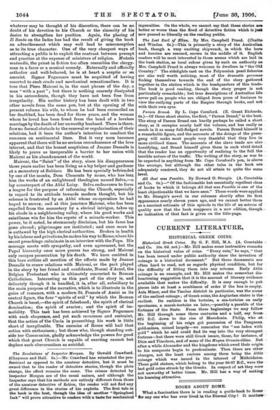NOVELS.
THE SAINT.*
THE growth of the theological or religious romance is only part of that octopus-like advanceof fictionwhich threatens every de- partment of letters with impartial intrusion. Signor Fogazzaro's much-discussed novel, being written by a professing Roman Catholic, might well be supposed to share the character istics of a type of novel with which we have become familiar in late years,—one in which a nominal adherence to the tenets of that Communion is combined with a strong personal bias in favour of those who stand outside it. For our own part, we confess that there is something repugnant in this attitude. Fab est et ab poste doceri is a good maxim, but such criticism as we have indicated, if it can hardly be described as that of a renegade or deserter, implies at legit a desire to make the best of two worlds or of two ceeds It resembles the denunciations of a nation by a denationalise( citizen, and honest opponents can never feel very proud of such an ally. To include Signor Fogazzaro's novel in this category would be most unjust, and it is only right to warn those who may not have read his story in Italian that, • Tlw Saint. By Antonio Formate. Translated by M. Prieberd.Agnetti. London: Hodder sloeStoughtea. res.]
whatever may be thought of his discretion, there can be no doubt of his devotion to his Church or the sincerity of his desire to strengthen her position. Again, the placing of
Il Santo on the Index has had the result of giving the book an advertisement which may well lead to misconception
as to its true character. One of the very cheapest ways of
attracting a public is to exploit the contrast between precept and practice at the expense of ministers of religion. Mutatis mutandis, the priest in fiction too often resembles the clergy-
man in a farce or a musical comedy. Externally and officially orthodox and well-behaved, he is at heart a sceptic or an amorist. Signor Fogazzaro must be acquitted of having resorted to such crude and mechanical sensationalism. It is true that Piero Maironi is, in the cant phrase of the day, a man " with a past " ; but there is nothing coarsely dissipated in his antecedents, though they have not been free from irregularity. His earlier history has been dealt with in two other novels from the same pen, but at the opening of the present volume his wife, to whom be had been reconciled on her deathbed, has been dead for three years, and the woman whom be loved has been freed from the bond of a loveless marriage by the death of her unworthy husband. There is there- fore no formal obstacle to the renewal or regularisation of their relations, had it been the author's intention to conduct the romance on sentimental lines. But it very soon becomes apparent that there will be no serious recrudescence of the love interest, and that the honest scepticism of Jeanne Dessalle is likely to prove as insuperable a barrier to her union with Maironi as his abandonment of the world.
Maironi, the "Saint" of the story, since his disappearance three years earlier has been living as a lay helper and gardener at a monastery at Subiaco. He has been specially befriended by one of the monks, Dom Clemente by name, who has lent him the works of an enlightened theologian named Selva,—a lay counterpart of the Abbe Loisy. Selva endeavours to form a league for the purpose of reforming the Church, especially in regard to its attitude towards modern thought, but his scheme is frustrated by an Abbe whose co-operation he had hoped to secure; and at this juncture Maironi, who has been expelled from the monastery by a clerical intrigue, takes up his abode in a neighbouring valley, where his good works and saintliness win for him the repute of a miracle-worker. This power, be it noted, he strenuously disclaims, but his fame has gone abroad; pilgrimages are instituted; and once more he is outlawed by the high clerical authorities. Broken in health by his labour and privations,he makes his way to Rome,where his secret preachings culminate in an interview with the Pope. His message meets with sympathy, and even agreement, but the Papal hierarchy once more proves too strong, and Maironi only escapes persecution by his death. We have omitted in this bare outline all mention of the efforts made by Jeanne Dessalle to renew relations with Maironi, or the part played in the story by her friend and confidante, Noemi d'Arxel, the Belgian Protestant who is ultimately converted to Roman Catholicism. Interesting as this part of the story is, and delicately though it is handled, it is, after all, subsidiary to the main purpose of the narrative, which is to illustrate in the guise of romance, with a modern St. Francis of Assisi as its central figure, the four " spirits of evil" by which the Roman Church is beset,—the spirit of falsehood; the spirit of clerical domination; the spirit of avarice ; and the spirit of im- mobility. This task has been achieved by Signor Fogazzaro with such eloquence, and yet such reverence and restraint, that the action of the Curia in proscribing his work is little short of inexplicable. The enemies of Rome will bail that action with enthusiasm ; but those who, though standing out- side her Communion, gladly acknowledge the powers for good which that great Church is capable of exerting cannot but deplore such obscurantism as suicidal.



























































 Previous page
Previous page